人教版八年级英语下册Unit9-单元知识汇总
人教版八年级下册英语Unit 9单元语法知识点总结

人教版八年级下册英语Unit 9单元语法知识点总结本单元重点短语的具体用法1. at night:在夜晚。
例如:I usually go to bed at night.(我通常在夜晚睡觉。
)2. in a more natural environment:在一个更加自然的环境中。
例如:We can enjoy the beauty of nature in a more natural environment.(我们可以在一个更加自然的环境中欣赏大自然的美丽。
)3. all year round:一年到头;终年。
例如:The flowers bloom all year round in this garden.(这个花园里的花一年到头都开放。
)4. be far from:离……远。
例如:The school is far from my home.(学校离我家很远。
)5. in the dark:在黑暗中。
例如:I can't see anything in the dark.(我在黑暗中什么也看不见。
)6. in the past:在过去。
例如:Life was very different in the past.(过去的生活非常不同。
)7. have been to sp.:去过某地。
例如:I have been to Beijing many times.(我去过北京很多次。
)8. science museum:科学博物馆。
例如:We visited the science museum last weekend.(我们上周末参观了科学博物馆。
)9. history museum:历史博物馆。
例如:The history museum has many interesting exhibits.(历史博物馆有很多有趣的展品。
)10. amusement park:游乐园。
例如:We had a great time at the amusement park.(我们在游乐园玩得很开心。
人教版八年级英语下册Unit9课文+单词+知识梳理+词汇讲解+句型解析

⼈教版⼋年级英语下册Unit9课⽂+单词+知识梳理+词汇讲解+句型解析【重点短语】1. at n ight 在晚上2.in a m ore natural environ m e nt在⼀个更加⾃然的环境中3. a l l year round ⼀年到头,终年4.be far f ro m 离......远5.in the dark 在⿊暗中6.in the past在过去7.have been to sp 去过某地8.sc ience m useu m科学博物馆9.history m useu m 历史博物馆10.a m use m e nt park 游乐园11.go so m e w here di f ferent去不同的地⽅12.go skat ing 去滑冰13.take the sub way 坐地铁14.a great way to spend a Saturday afternoon⼀个过周六下午的好办法15.a l l the old m ovie ca m era所有的古⽼的电影摄影机16.learn about sth 了解有关.....的情况17. on the weekend 在周末18.ca m p in the m o u ntains 在⼤⼭⾥露营19.put up a tent 搭帐篷20.in such a rapid way 以如此速猛的⽅式21.dif ferent k inas of 各种各样的22.develop m e nt of toi lets厕所的发展23.socia l groups 社会团体24.the tea art perform a nces 茶艺表演25.make a perfect cu p of tea with beaut i fu l tea sets.⽤漂亮的茶具沏⼀杯完美的茶26. a n ice place to enjoy tea ⼀个品茶的好地⽅27.Thousands of数以千计的28.internat ional M u seu m of Toi lets国际厕所博物馆29.the Terracotta Arm y 兵马俑30.southeast Asia 东南亚31.night Safar i夜间动物园32.three quarters四分之三33. an Engl ish-speaking country⼀个讲英语的国家34.have a proble m d oing sth 做某事很困难35.during the dayt i m e 在⽩天36. a couple of t imes 好⼏次37.r ight no w 现在,⽬前38. an a m use m e nt park with a specia l t he m e⼀个有特别的主题的游乐园39.Walk around the park 在公园⾥到处⾛40. hear of听说41.take a r ide 兜风42. another province 另⼀个省43.the B ird’s Nest鸟巢44. encourage sb to do sth ⿎励某⼈做某事45. on the one hand....on the other han d ⼀⽅⾯,另⼀⽅⾯【重点句型】1. Have you ever been to a sc ience m useu m?你曾经去过科学博物馆吗?2.Let\'s go so m e w here d i f ferent today.让我们今天去不同的地⽅吧。
八年级下册人教版英语unit 9知识点

八年级下册人教版英语unit 9知识点在八年级下册人教版英语中,第九单元着重介绍的是一些常见的交通方式及交通规则。
本文将在此基础上对此单元的重点知识点进行总结。
一、交通工具的种类在日常生活中,人们使用的交通工具种类丰富,有汽车、火车、地铁、公交车、自行车等各种不同的类别,每种车辆都有其特点和使用场景。
除了以上常用的交通工具,本单元的教材还涉及到了一些不太常见但对应特殊情况的交通工具和方式,例如:船、直升飞机、出租车等。
二、交通规则和标志在英语国家,交通规则是非常重视的。
为保证行车安全,英国制定了一系列交通标志和规则。
其中,交通标志是最常见的方式,其种类繁多,我们要对它们有所了解,才能准确、安全地行驶。
在教材中,我们了解到了一些常用的道路标志及其含义,例如:限速标志、禁止通行标志、警告标志等等。
当然,在实际行车过程中,还有很多其他类型的标志需要我们注意和理解。
此外,交通规则方面也很重要。
在英语课堂上,我们学习了一些行车前、行车时、行车后应该注意的事项,例如:如何调节车镜、如何拐弯、如何超车等等,这些知识都要牢记于心。
三、应急措施和自我保护在实际行车中,我们难免会遇到一些突发状况,例如:车辆故障、交通事故等等。
在这些情况下,及时采取正确的应急措施将直接关系到行车人员的安全。
除此之外,在地铁、火车等公共交通工具上,我们还要保证个人的财物和个人安全。
知道如何在紧急情况下正确使用应急开关等设备,以及保持沉着冷静,也都是非常重要的。
四、交通出行文化交通出行文化也是本单元涵盖的一个重要主题。
在英国,有很多独特的交通出行文化,例如:左侧行驶、优先让行等等。
虽然我们在国内不一定需要采纳这些文化特点,但在海外旅游或长期居住等情境下,对这些文化的理解将有助于自我适应和了解当地的文化。
以上就是本次总结的八年级下册人教版英语unit 9的知识点。
希望大家都能通过这些知识,更好地掌握英语,顺利通过本单元的学习。
人教版八年级下册英语第九单元知识点归纳总结

Unit9 Haveyoueverbeentoamuseum?一、词汇与短语◆重点单词A 局部1.amusement 消遣;玩耍n. 3.somewhere 在某处;到某处adv. 5.camera 照相机;摄影机;摄像机n. 7.invention 制造;制造物n. 9.invent 制造;制造v.2.social 社会的adj.4.peaceful 和平的;清静的adj. 6.performance 表演;演出n. 8.perfect 完善的;完全的adj. 10.itself (it 的反身代词)它自己pron.11.unbelievable 难以置信的;不真实的adj. 12.collect 收集;采集v.13.progress 进步;进展v.&n. 15.rapid 快速的;快速的adj. 17.unusual 特别的;不寻常的adj. 19.toilet 坐便器;厕所n. 14.theme 主题n.16.ride 供乘骑的游乐设施;短途旅程n. 18.province 省份n.20.encourage 鼓舞v.21.German 德国的;德语的;德国人的adj. 德语;德国人n.B 局部1.thousand 一千num. 3.safe 安全的;无危急的adj. 5.simply 仅仅;只;不过adj. 7.fear 几可怕;惧怕v.&n. 9.Indian 印度的adj. 印度人n. 2.fox 狐狸n.4.equator 赤道n. 6.spring 春天n. 8.mostly 主要地;通常adv. 10.location 地点;位置n.11.whether 不管……(还是);或者……(或者);是否conj. 12.Japanese 日本的;日本人的;日语的adj. 日本人;日语n. 13.whenever 在任何……的时候;无论何时conj.◆重点短语A 局部1.amusementpark 游乐场3.teaart 茶艺5.acoupleof 两个;一对;几个7.ahistorymuseum 历史博物馆9.aspacemuseum 太空博物馆11.anartmuseum 艺术博物馆13.awaterpark 水上公园2.learnabout 了解4.leadto 导致6.campinthemountains 在山中宿营8.putupatent 搭帐篷10.haveinformationabout 有关于……的信息12.progressinsucharapidway 进步如此快速14.acoupleoftimes 几次15.inthefuture 在将来17.haveagreattime 过得开心19.afilmmuseum 电影博物馆16.encouragesb.todosth. 鼓舞某人做某事18.somewheredifferent 某个不同的地方20.theteaartperformance 茶艺表演21.takearideontheboatforseveraldays 乘船旅行几天22.thehistoryanddevelopmentof…................. 的历史和进展B 局部1.allyearround 全年3.alotofthetime 大局部时间5.outsideofChina 在中国以外7.duringthedaytime 在白天9.becloseto 靠近;接近11.choosetodosth. 选择做某事2.thousandsof 数以千计的;许很多多的4.inthedark 在黑暗中6.anEnglish -speakingcountry 一个说英语的国家8.haveproblemsdoingsth. 做某事有困难10.thebesttimetodosth. 做某事的最好时间12.befarfrom 远离13.threequartersofthepopulation 人口的四分之三14.ontheonehand ……ontheotherhand ……一方面……另一方面……◆重点句子A 局部1.—Have youever beento thespacemuseum? —你曾去过太空博物馆吗?—Yes,Ihave.Howaboutyou? —是的,我去过。
英语八年级下册unit9知识点

英语八年级下册unit9知识点Unit9的主题是“Do you want to go to a movie?”,主要学习的是谈论你的喜好和接受或拒绝邀请的表达方式。
以下是Unit9的知识点总结。
一、句型结构1.询问对方的喜好Do you like…?What do you think of…?2.表达喜好I like…I love…I’m crazy about…It’s my favorite.3.接受邀请Sure, I’d love to.That sounds great/good. I’d be happy/pleased to.4.拒绝邀请I’m sorry, but I can’t. I’m afraid I have to…Maybe another time.二、词汇1.电影genresaction movie 动作片comedy 喜剧drama 剧情片horror movie 恐怖片2.电影院cinema/movie theater3.邀请及回应invite and response Would you like to…? 你想要……吗?Can you…? 你能……吗?Do you want to…? 你想……吗?四、语法1.比较级和最高级形容词和副词在表示比较的时候,需要使用比较级和最高级。
从以下三个方面来比较:一般比较:as + 形容词/副词 + as比较级:形容词/副词 + er + than最高级:the + 形容词/副词最高级 + 名词2.情态动词情态动词可以用于表达建议、请求、命令、许可等意思。
can 可以could 能够may 可以might 可能should 应该shall 将will 意愿would 意愿五、表达技巧1.巧用缩略词在口语中,使用缩略词表达更为简洁。
I’d like to = I would like to = I wanna2.注意语调和语气语气是表达意图的关键所在,我们需要通过语调和语气来准确表达自己想要表达的情感。
(完整版)人教版新目标八年级下册英语Unit9知识点
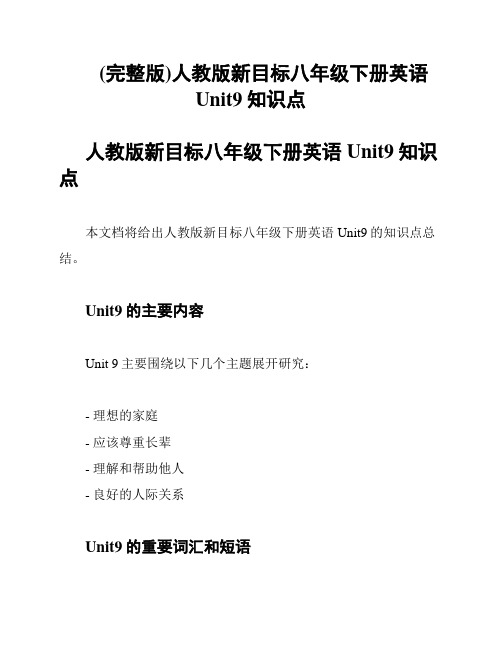
(完整版)人教版新目标八年级下册英语
Unit9知识点
人教版新目标八年级下册英语Unit9知识点
本文档将给出人教版新目标八年级下册英语Unit9的知识点总结。
Unit9的主要内容
Unit 9主要围绕以下几个主题展开研究:
- 理想的家庭
- 应该尊重长辈
- 理解和帮助他人
- 良好的人际关系
Unit9的重要词汇和短语
本单元涵盖了一些重要的词汇和短语,包括但不限于:
- behave (行为)
- respect (尊敬)
- generation gap (代沟)
- argue (争吵)
- family values (家庭价值观)
Unit9的语法重点
在这个单元中,有一些语法知识需要重点掌握:
- 情态动词 "should" 的用法
- 过去进行时的基本结构和用法
Unit9的研究重点
Unit 9的研究重点包括但不限于以下几个方面:
- 了解和表达理想的家庭
- 研究并运用适当的家庭价值观
- 学会应对代沟问题和家庭争吵
- 理解和运用情态动词 "should"
Unit9的研究资源推荐
为了更好地研究和巩固Unit 9的知识,可以尝试以下研究资源:
- 教科书中的课文和练题
- 在线研究平台上的相关练和测验
- 视频课程和教学视频
以上是人教版新目标八年级下册英语Unit9的知识点总结,希
望对你的学习有所帮助!。
人教版八年级下册英语 Unit 9单元知识点提纲
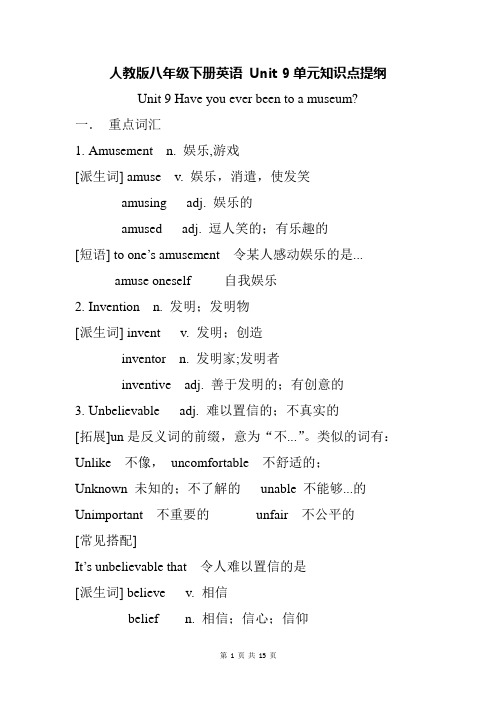
人教版八年级下册英语Unit 9单元知识点提纲Unit 9 Have you ever been to a museum? 一.重点词汇1.Amusement n. 娱乐,游戏[派生词] amuse v. 娱乐,消遣,使发笑amusing adj. 娱乐的amused adj. 逗人笑的;有乐趣的[短语] to one’s amusement 令某人感动娱乐的是...amuse oneself 自我娱乐2.Invention n. 发明;发明物[派生词] invent v. 发明;创造inventor n. 发明家;发明者inventive adj. 善于发明的;有创意的3.Unbelievable adj. 难以置信的;不真实的[拓展]un是反义词的前缀,意为“不...”。
类似的词有:Unlike 不像,uncomfortable 不舒适的;Unknown 未知的;不了解的unable 不能够...的Unimportant 不重要的unfair 不公平的[常见搭配]It’s unbelievable that 令人难以置信的是[派生词] believe v. 相信belief n. 相信;信心;信仰Believable adj. 可相信的,可信任的[常见搭配]Believe it or not! 信不信由你!Believe in sb./sth 相信某人或认可某事Seeing is believing. 眼见为实。
/百闻不如一见。
4.Progress n. 进步;进展v. 取得进步;取得进展;改进[常见搭配] make progress in (doing) sth. 在某方面取得进展注意:progress 前可以有great, much, a little等词修饰。
[派生词]progressive adj. 进步的;先进的;开明的Progression n. 发展;前进;进程5.Rapid adj. 快速的;迅速的Rapidly adv. 迅速地;快速地6.Unusual adj. 不同寻常的[注意]表示一个不同寻常的事/人时,要用不定冠词an,例如:an unusual experience 一次不同寻常的经历[联想] usual adj. 普通的,通常的Usually adv. 通常7.Encourage v. 鼓励,鼓舞[派生词] encouragement n. 鼓舞,鼓励[反义词] discourage v. 使泄气;使沮丧[常见搭配] encourage sb.to do sth 鼓励某人做某事encourage sb in (doing)sth 在某方面鼓励某人例如:My parents always encourage me in my school work.我父母在学习上总是鼓励我。
人教版英语八年级下册英语第9单元知识点归纳
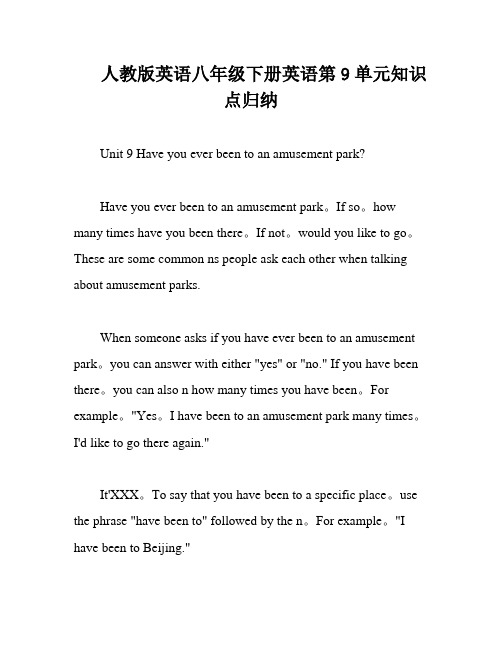
人教版英语八年级下册英语第9单元知识点归纳Unit 9 Have you ever been to an amusement park?Have you ever been to an amusement park。
If so。
how many times have you been there。
If not。
would you like to go。
These are some common ns people ask each other when talking about amusement parks.When someone asks if you have ever been to an amusement park。
you can answer with either "yes" or "no." If you have been there。
you can also n how many times you have been。
For example。
"Yes。
I have been to an amusement park many times。
I'd like to go there again."It'XXX。
To say that you have been to a specific place。
use the phrase "have been to" followed by the n。
For example。
"I have been to Beijing."It'XXX een "have been to" and "have gone to." "Have been to" indicates that you have been to a place and returned。
人教版八年级英语下册Unit9 Have you ever been to a museum知识点梳理及单元复习
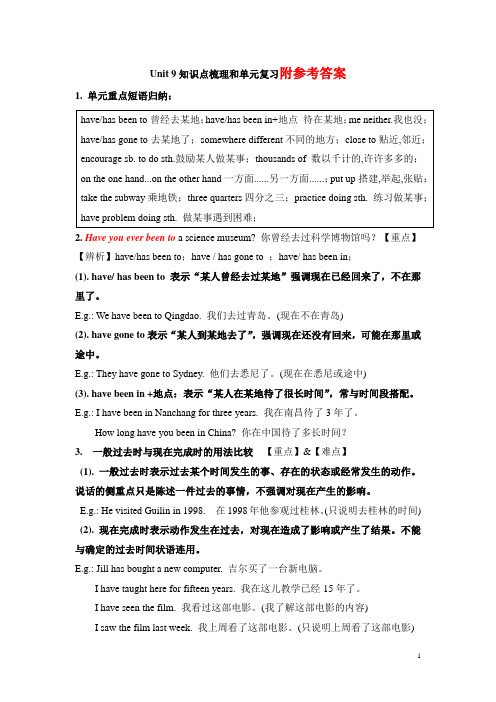
Unit 9知识点梳理和单元复习附参考答案1. 单元重点短语归纳:have/has been to曾经去某地;have/has been in+地点待在某地;me neither.我也没;have/has gone to去某地了;somewhere different不同的地方;close to贴近,邻近;encourage sb. to do sth.鼓励某人做某事;thousands of 数以千计的,许许多多的;on the one hand...on the other hand一方面......另一方面......;put up搭建,举起,张贴;take the subway乘地铁;three quarters四分之三;practice doing sth. 练习做某事;have problem doing sth. 做某事遇到困难;2. Have you ever been to a science museum? 你曾经去过科学博物馆吗?【重点】【辨析】have/has been to;have / has gone to ;have/ has been in;(1). have/ has been to 表示“某人曾经去过某地”强调现在已经回来了,不在那里了。
E.g.: We have been to Qingdao. 我们去过青岛。
(现在不在青岛)(2). have gone to表示“某人到某地去了”,强调现在还没有回来,可能在那里或途中。
E.g.: They have gone to Sydney. 他们去悉尼了。
(现在在悉尼或途中)(3). have been in +地点:表示“某人在某地待了很长时间”,常与时间段搭配。
E.g.: I have been in Nanchang for three years. 我在南昌待了3年了。
How long have you been in China? 你在中国待了多长时间?3. 一般过去时与现在完成时的用法比较【重点】&【难点】(1). 一般过去时表示过去某个时间发生的事、存在的状态或经常发生的动作。
Unit 9单元知识点人教版八年级英语下册
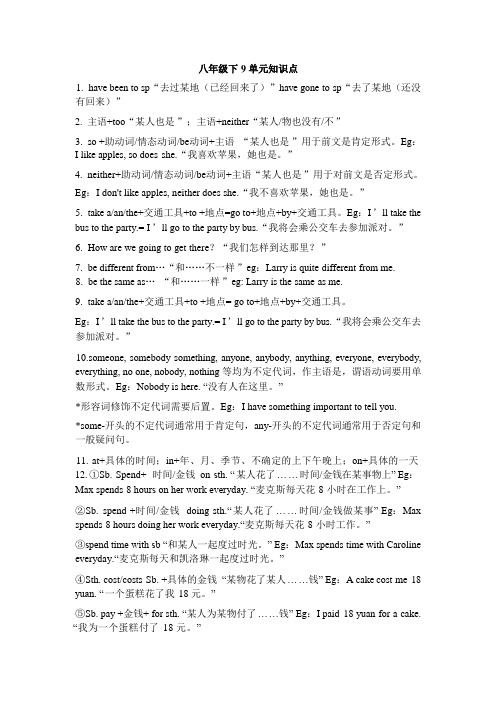
1. have been to sp“去过某地(已经回来了)”have gone to sp“去了某地(还没有回来)”2. 主语+too“某人也是”;主语+neither“某人/物也没有/不”3. so +助动词/情态动词/be动词+主语“某人也是”用于前文是肯定形式。
Eg:I like apples, so does she.“我喜欢苹果,她也是。
”4. neither+助动词/情态动词/be动词+主语“某人也是”用于对前文是否定形式。
Eg:I don't like apples, neither does she.“我不喜欢苹果,她也是。
”5. take a/an/the+交通工具+to +地点=go to+地点+by+交通工具。
Eg:I ’ll take the bus to the party.= I ’ll go to the party by bus.“我将会乘公交车去参加派对。
”6. How are we going to get there?“我们怎样到达那里?”7. be different from…“和……不一样”eg:Larry is quite different from me.8. be the same as… “和……一样”eg: Larry is the same as me.9. take a/an/the+交通工具+to +地点= go to+地点+by+交通工具。
Eg:I ’ll take the bus to the party.= I ’ll go to the party by bus.“我将会乘公交车去参加派对。
”10.someone, somebody something, anyone, anybody, anything, everyone, everybody, everything, no one, nobody, nothing 等均为不定代词,作主语是,谓语动词要用单数形式。
人教版八年级英语下册Unit9知识点归纳

Unit9 Have you ever been to a museu知m?识点归纳一、重点短语1.at nigh在t 夜晚2.in a more naturalenvironment在一个更加自然的环境中3.all year rou一nd年到头;终年25.make a perfectcup of t eawith b eautiful t ea set用s秀丽的茶具沏一杯完善的茶26.a nice place to enjoy一t个e a品茶的好地方4. be far fro离m……远27. thousands of数以千计的5.in the dar在k 黑暗中6.in the pas在t 过去7.have been to s去p.过某地8.science museum科学博物馆28.International Museum of Toi国l e际t s厕所博物馆29.the Terracotta Arm兵y 马俑30.Southeast Asi东a 南亚9. history museum历史博物馆31. Night Safar夜i间动物园10.amusement park游乐园11.go somewhere differen去t不同的地方12.go skating去滑冰13.take the subwa坐y地铁32.three quarte四r s分之三33.an English-speakinc g ountry一个讲英语的国家34.have problem doing s t做h.某事很困难14.a great way to spend a Saturday afterno3o5n. during the dayti在me白天一个过周六下午的好方法15.allthe o ld m ovie cameras全部的古老的电影摄影机16.learn about s解t h有. 关。
的状况17.on the weekend在周末18.camp in the mountain在s大山里露营19.put up a t e搭n t帐篷20.in such a rapid w以ay如此迅猛的方式21.different kinds各o种f 各样的36.a couple of tim好es几次37.right now现在;目前38.an a musement park w ith a s pecialtheme 一个有特别的主题的游乐园39.walk around the pa在r k公园里处处走40.hear of听说41.take a ri兜d e风42.another provin另c e一个省43.the Bird’s N鸟es巢t22. development of toil厕e t所s的进展44. encourage sb. to do鼓s励t h某.人做某事23. social group社s 会团体45. on the one hand... on the other一h方and.24. the tea art performa茶nc艺es表演面,另一方面二、用法归纳1.a great way to do sth 一个做某事的好方法2.watch sb to do sth 观看某人做了某事3.It’sunbelievable that....很难信任......4.e ncourage sb to do sth 鼓舞某人做某事5.have problem (in〕doing sth 做某事很费力6.a s...as.. 和 .. 一样7.t he best time to do sth 做某事的最正确时间8.c hoose to do sth 选择做某事9.tell sb to do sth 告知某人做某事三、重点句型1.Have you ever been to. .. ?Have you ever been to a science museum?你曾经去过科学博物馆吗?2.Let’s…Let’s go somewhere different today.我们今日去个不同的地方吧。
人教版八年级下册英语Unit9知识点总结

Unit9 Have you ever been to a museum?名词:camera 照相机;摄像机toilet 坐便器;厕所province 省份spring 春天动词:encourage 鼓舞形容词:fox 狐狸information 信息;资料invention 制造;制造物amusement 消遣;玩耍collect 收集;采集ride 供乘骑的游乐设施;短途旅程unbelievable 难以置信的;不真实的rapid 快速的;快速的unusual 特别的;不寻常的副词:simply 仅仅;只;不过数词:thousand 一千连词:social 社会的peaceful 和平的;清静的mostly 主要的;通常perfect 完善的;完全的safe 安全的;无危急的whether不管……〔还是〕;或者……〔或者〕;是否whenever 在任何……的时候;无论何时兼类词:progress v&n 进步;进展fear v&n 可怕;惧怕Indian adj 印度的 n 印度人German adj 德国的;德语的;德国人的 n 德语;德国人Japanese adj 日本的;日本人的;日语的 n 日本人;日语短语:amusement park 游乐场tea art 茶艺tea set 茶具a couple of 两个;一对;几个thousands of 数以千计的;许很多多的all year round 全年on the one hand……on the other hand……一方面……另一方面……学问点:1、to one”s amusement 令某人发笑的是to one”s surprise 令某人吃惊的是to one”s joy/happiness 令某人快活的是To Tom”s amusement, Lily and Jack are dancing and singing in the car.令 Tom 发笑的是,Lily 和Jack 在车里又唱又跳。
八年级英语下册Unit9Haveyoueverbeentoamuseum单元语法知识梳理人教版

Unit 9 Have you ever been to a museum现在完成时(Ⅱ)1.现在完成时表示经历的用法现在完成时常用have been to(去过),ever(曾经),never(从没)等表示经历。
用法说明示例have / has been to表示去过某地,可以与never,ever,just,once等连用。
Mr. Smith has ever been to China three times.史密斯先生曾去过中国三次。
ever常用于现在完成时的一般疑问句中,放在主语之后,过去分词之前。
Have you ever visited the Palace Museum? 你曾参观过故宫博物馆吗?never表示否定,用在助动词have / has之后,过去分词之前。
表示否定的简短回答可以用neither。
—I have never been to Hong Kong.我从来没去过香港。
—Me neither.我也没去过。
2.have/ has been to与have / has gone to的用法区别用法说明示例have/ has been to意为“去过某地”,表示去过某地,现在已经回来了,通常与表示次数的状语连用,如twice,several times,ever,never等She has been to Europe twice.她去过欧洲两次。
(已经回来了)I have never been to the Great Wall.我从未去过长城。
have / has gone to意为“去了某地”,表示到某地去了,强调说话时去某地的人不在场(可能在途中,也可能已到达)。
—Where is Jim? 吉姆在哪里?—He has gone to England.他去英国了。
(现在不在这里)若have/ has been to或have / has gone to后接副词,则省略to。
人教版八年级英语下册Unit9知识点归纳

人教版八年级英语下册Unit9知识点归纳Unit 9: Have you ever been to a museum。
Knowledge Points Summary1.Key Phrases:At night: during the nightIn a more natural environment: in a setting that is more naturalAll year round: XXXXXX: XXXIn the dark: in a place without lightIn the past: in us timesHave been to: visited a placeScience museum: a museum focused on scienceHistory museum: a museum focused on historyXXX park: XXXGo XXX: visit a place that is not familiarGo skating: ice skateTake the subway: XXX systemA great way to XXXAll the old movie cameras: all the antique movie cameras Learn about something: gain knowledge about a topic On the weekend: during the weekendXXX: sleep in a tent in the mountainsPut up a tent: assemble a XXXIn such a rapid way: in a very fast mannerDifferent kinds of: us types ofDevelopment of toilets: the progress of XXXSocial groups: XXXXXX XXX: XXXMake a perfect cup of tea with beautiful tea sets: XXXA nice place to XXXXXX of: many。
- 1、下载文档前请自行甄别文档内容的完整性,平台不提供额外的编辑、内容补充、找答案等附加服务。
- 2、"仅部分预览"的文档,不可在线预览部分如存在完整性等问题,可反馈申请退款(可完整预览的文档不适用该条件!)。
- 3、如文档侵犯您的权益,请联系客服反馈,我们会尽快为您处理(人工客服工作时间:9:00-18:30)。
Unit9 单元知识汇总
【短语归纳】
1. at night在夜晚
2. in a more natural environment在一个更加自然的环境中
3. all year round一年到头;终年
4. be far from 离……远
5. in the dark 在黑暗中
6. in the past 在过去
7. have been to sp. 去过某地
8. science museum 科学博物馆
9. history museum 历史博物馆
10. amusement park 游乐园
11. go somewhere different 去不同的地方
12. go skating 去滑冰
13. take the subway 坐地铁
14. a great way to spend a Saturday afternoon一个过周六下午的好方法
15. all the old movie cameras所有的古老的电影摄影机
16. learn about sth.解有关……的情况
17. on the weekend 在周末
18. camp in the mountains 在大山里露营
19. put up a tent搭帐篷
20. in such a rapid way 以如此迅猛的方式
21. different kinds of各种各样的
22. development of toilets 厕所的发展
23. social groups 社会团体
24. the tea art performances茶艺表演
25. make a perfect cup of tea with beautiful tea sets用漂亮的茶具沏一杯完美的茶
26. a nice place to enjoy tea 一个品茶的好地方
27. thousands of…数以千计的……
28. International Museum of Toilets国际厕所博物馆
29. the Terracotta Army 兵马俑
30. Southeast Asia东南亚
31. Night Safari 夜间动物园
32. three quarters 四分之三
33. an English-speaking country一个讲英语的国家
34. have problem doing sth. 做某事很困难
35. during the daytime在白天
36. a couple of times 好几次
37. right now 现在;目前
38. an amusement park with a special theme
一个有特别的主题的游乐园
39. walk around the park 在公园里到处走
40. hear of 听说
41. take a ride兜风
42. another province另一个省
43. t he Bird’s Nest鸟巢
44. encourage sb. to do sth.鼓励某人做某事
45. on the one hand... on the other hand…一方面,另一方面【用法集萃】
1. a great way to do sth. 一个做某事的好方法
2.It’s unbelievable that...很难相信……
3. watch sb. do sth观看某人做了某事
4. encourage sb. to do sth.鼓励某人做某事
5. as... as...和……一样……
6. love doing sth.喜欢做某事
7. want to do sth.想要做某事
8. see sb. doing sth.看见某人正在做某事
9. have problems (in) doing sth.做某事很费劲
10. seem+形容词看起来像……
11. the best time to do sth.做某事的最佳时间
12. choose to do sth.选择做某事
13. tell sb. to do sth.告诉某人做某事
【典句必背】
1. Have you ever been to a science museum?
你曾经去过科学博物馆吗?
2. Let’s go somewhere different today.我们今天去个不同的地方吧。
3. It’s unbelievable that technology has progressed in such a rapid way!
科技以如此迅猛的方式发展真是令人难以置信啊!
4. Whether you like Indian food, Western food or Japanese fo od, you’ll find it all in Singapore!
不管你喜欢印度食品、西方食品还是日本食品,在新加坡你都能找到!
5. One great thing about Singapore is that the temperature is almost the same all year round.新加坡一个很大的特征是它的气温几乎一年到头都是一样的。
6. It is best to visit Singapore...
最好……游览新加坡。
